The global packaging laminate market is valued at USD 42.5 billion in 2025 and is slated to reach USD 78.3 billion by 2035, recording an absolute increase of USD 35.8 billion over the forecast period. As reported in Future Market Insights (FMI)’s verified packaging intelligence series, covering sustainability and material lifecycle trends, this translates into a total growth of 84.2%, with the market forecast to expand at a compound annual growth rate (CAGR) of 6.3% between 2025 and 2035. The overall market size is expected to grow by nearly 1.84X during the same period, supported by increasing demand for moisture-resistant food packaging, growing adoption of barrier laminate structures in pharmaceutical applications, and rising preference for lightweight flexible packaging solutions across consumer goods and industrial applications.
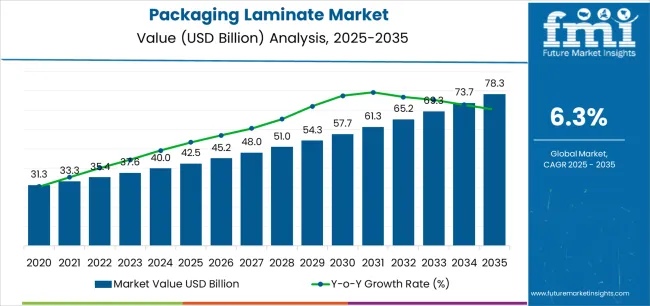
Between 2025 and 2030, the packaging laminate market is projected to expand from USD 42.5 billion to USD 59.1 billion, resulting in a value increase of USD 16.6 billion, which represents 46.4% of the total forecast growth for the decade. This phase of development will be shaped by increasing demand for high-barrier packaging in ready-to-eat food segments, rising adoption of retortable laminate structures, and growing requirements for oxygen and moisture protection across pharmaceutical and nutraceutical packaging. Food processors are expanding their laminate sourcing capabilities to address the growing demand for extended shelf-life packaging, microwave-safe formats, and portion control solutions.
| Metric | Value |
|---|---|
| Estimated Value in (2025E) | USD 42.5 billion |
| Forecast Value in (2035F) | USD 78.3 billion |
| Forecast CAGR (2025 to 2035) | 6.3% |
From 2030 to 2035, the market is forecast to grow from USD 59.1 billion to USD 78.3 billion, adding another USD 19.2 billion, which constitutes 53.6% of the overall ten-year expansion. This period is expected to be characterized by the expansion of compostable and bio-based laminate technologies, the integration of smart packaging features including freshness indicators and QR code printing, and the development of mono-material laminate structures with enhanced recyclability characteristics. The growing adoption of e-commerce packaging and direct-to-consumer delivery formats will drive demand for laminates with superior puncture resistance, compression strength, and tamper-evident features.
Between 2020 and 2025, the packaging laminate market experienced robust growth, driven by increasing demand for flexible packaging formats in food retail and growing recognition of laminates as essential packaging solutions for moisture-sensitive and oxygen-sensitive products across pharmaceuticals, electronics, and agricultural sectors. The market developed as converters recognized the potential for multi-layer laminates to provide superior barrier protection while reducing packaging weight and enabling improved graphics reproduction. Technological advancement in adhesive-less lamination and solvent-free coating technologies began emphasizing the critical importance of maintaining food contact compliance and reducing volatile organic compound emissions in laminate production operations.
Market expansion is being supported by the increasing global demand for flexible packaging formats and the corresponding need for packaging solutions that can provide superior barrier properties, mechanical strength, and printability while enabling weight reduction and distribution efficiency across various food, pharmaceutical, and consumer product applications. Modern brand owners and packaging converters are increasingly focused on implementing packaging solutions that can protect product quality, extend shelf life, and deliver compelling visual appeal throughout complex distribution networks. Packaging laminates' proven ability to deliver exceptional barrier performance against oxygen, moisture, light, and contaminants, enable multi-functional packaging structures, and support cost-effective production make them essential packaging formats for contemporary food launches, pharmaceutical products, and consumer goods packaging.
The growing emphasis on product protection and supply chain efficiency is driving demand for laminates that can support extended distribution requirements, reduce packaging material usage, and enable high-speed converting operations. Converters' preference for packaging that combines excellent barrier performance with processing versatility and design flexibility is creating opportunities for innovative laminate implementations. The rising influence of ready-to-eat food consumption and e-commerce distribution is also contributing to increased demand for laminates that can provide puncture resistance, seal integrity, and protection during transportation.
The packaging laminate market is poised for rapid growth and transformation. As industries across food & beverage, pharmaceuticals, personal care, agricultural chemicals, and industrial packaging seek materials that deliver exceptional barrier protection, mechanical strength, and processing efficiency, packaging laminates are gaining prominence not just as commodity packaging materials but as strategic enablers of product preservation and brand differentiation.
Rising food consumption in Asia-Pacific and expanding pharmaceutical packaging markets globally amplify demand, while converters are leveraging innovations in adhesive-less lamination, bio-based film integration, and functional coating development.
Pathways like high-barrier pharmaceutical laminates, retortable food structures, and application-specific material optimization promise strong margin uplift, especially in high-value segments. Geographic expansion and vertical integration will capture volume, particularly where local converting capabilities and supply chain proximity are critical. Regulatory pressures around food safety, pharmaceutical packaging integrity, chemical compatibility, and packaging waste reduction give structural support.
The market is segmented by product type, material, application, thickness, lamination process, and region. By product type, the market is divided into multi-layer laminates, single-layer laminates, and specialty laminates. By material, it covers polyethylene-based, polypropylene-based, polyester-based, aluminum foil-based, and paper-based laminates. By application, it includes food & beverage, pharmaceuticals & healthcare, personal care & cosmetics, agricultural products, and industrial packaging. By thickness, the market is segmented into thin (below 50 microns), medium (50-150 microns), and thick (above 150 microns). The lamination process includes solvent-based, solventless, water-based, and extrusion lamination. By end-user, the market includes flexible packaging converters, food processors, pharmaceutical manufacturers, and consumer goods companies. Regionally, the market is divided into North America, Europe, East Asia, South Asia & Pacific, Latin America, and the Middle East & Africa.
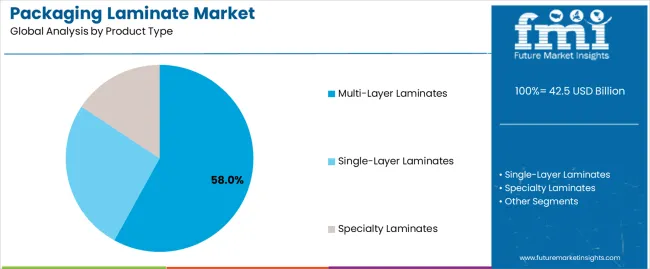
The multi-layer laminates segment is projected to account for 58% of the packaging laminate market in 2025, reaffirming its position as the leading product category. Food processors and pharmaceutical manufacturers increasingly utilize multi-layer laminate structures for their superior barrier properties combining oxygen protection, moisture resistance, and mechanical strength, excellent sealability, and versatility in applications ranging from food pouches to pharmaceutical blister lidding. Multi-layer laminate technology's advanced material combination capabilities and optimized performance characteristics directly address the industrial requirements for reliable product protection in high-volume packaging operations.
This product segment forms the foundation of modern flexible packaging operations, as it represents the laminate type with the greatest functional versatility and established market demand across multiple application categories and industry sectors. Converter investments in adhesive-less lamination equipment and barrier coating technologies continue to strengthen adoption among food processors and pharmaceutical manufacturers. With companies prioritizing product shelf life extension and packaging weight reduction, multi-layer laminates align with both performance requirements and cost optimization objectives, making them the central component of comprehensive flexible packaging strategies.
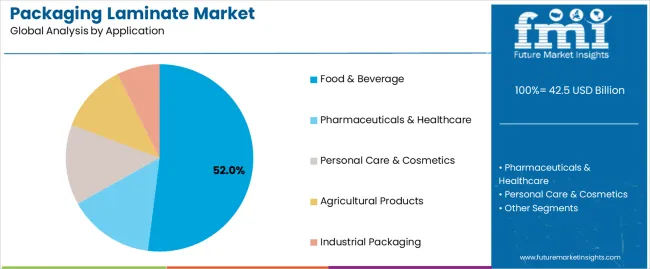
Food & beverage applications are projected to represent 52% of packaging laminate demand in 2025, underscoring their critical role as the primary industrial consumers of flexible laminate packaging for snack foods, frozen products, liquid packaging, and ready-to-eat meals. Food manufacturers prefer packaging laminates for their exceptional moisture and oxygen barrier capabilities, grease resistance, and ability to maintain product freshness while enabling attractive graphics and convenient packaging formats. Positioned as essential packaging materials for modern food product launches, packaging laminates offer both preservation advantages and consumer convenience benefits.
The segment is supported by continuous innovation in retortable laminate structures and the growing availability of microwave-safe materials that enable heat-and-eat convenience with enhanced food safety and extended shelf life. Additionally, food manufacturers are investing in supply chain partnerships to support large-volume laminate procurement and quality assurance. As frozen food consumption becomes more prevalent and ready-to-eat product complexity increases, food & beverage applications will continue to dominate the end-use market while supporting advanced barrier technology utilization and packaging innovation strategies.
The packaging laminate market is advancing rapidly due to increasing demand for flexible packaging formats and growing adoption of high-barrier laminate solutions that provide superior product protection, extended shelf life, and weight reduction benefits across diverse food, pharmaceutical, and consumer product applications. However, the market faces challenges, including raw material price volatility, complex recyclability requirements for multi-material structures, and the need for specialized lamination equipment investments. Innovation in adhesive-less lamination technologies and mono-material laminate development continues to influence product development and market expansion patterns.
The growing adoption of thermal lamination, extrusion lamination, and UV-curable adhesive systems is enabling converters to produce high-quality laminates with reduced solvent emissions, improved food contact compliance, and enhanced production efficiency. Advanced lamination technologies provide better bond strength while allowing faster processing speeds and consistent quality across various substrate combinations and applications. Manufacturers are increasingly recognizing the competitive advantages of clean lamination capabilities for regulatory compliance and operational cost reduction.
Modern laminate producers are incorporating time-temperature indicators, freshness sensors, QR code integration, and tamper-evident features to enhance product traceability, enable consumer engagement, and deliver value-added solutions to brand owners and retailers. These technologies improve supply chain visibility while enabling new market segments, including premium food products, pharmaceutical authentication, and interactive consumer packaging. Advanced feature integration also allows converters to support premium product positioning and application development beyond traditional commodity laminate supply.
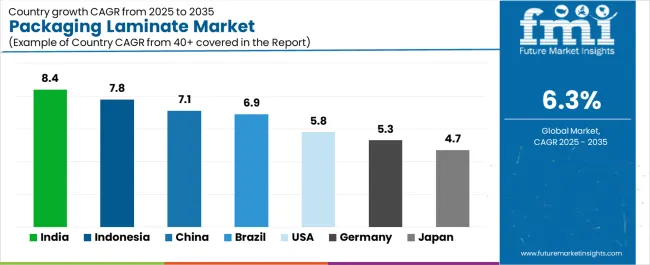
| Country | CAGR (2025-2035) |
|---|---|
| India | 8.4% |
| China | 7.1% |
| USA | 5.8% |
| Brazil | 6.9% |
| Germany | 5.3% |
| Japan | 4.7% |
| Indonesia | 7.8% |
The packaging laminate market is experiencing strong growth globally, with India leading at an 8.4% CAGR through 2035, driven by the expanding food processing sector, growing pharmaceutical manufacturing, and significant investment in flexible packaging infrastructure. China follows at 7.1%, supported by rapid food retail growth, increasing pharmaceutical production, and growing domestic converting capabilities. The USA shows growth at 5.8%, emphasizing convenience food innovation and pharmaceutical packaging advancement. Brazil records 6.9%, focusing on food processing expansion and flexible packaging adoption. Germany demonstrates 5.3% growth, prioritizing food safety standards and advanced converting technology excellence. Japan exhibits 4.7% growth, emphasizing precision manufacturing and quality laminate production. Indonesia shows 7.8% growth, supported by food processing development and growing consumer goods manufacturing.
The report covers an in-depth analysis of 40+ countries top-performing countries are highlighted below.
Revenue from packaging laminate in India is projected to exhibit exceptional growth with a CAGR of 8.4% through 2035, driven by expanding food processing capacity and rapidly growing pharmaceutical manufacturing supported by government initiatives promoting domestic flexible packaging development. The country's strong position in global food exports and increasing investment in FMCG manufacturing are creating substantial demand for high-barrier laminate solutions. Major food processors and pharmaceutical companies are establishing comprehensive laminate sourcing capabilities to serve both domestic demand and export markets.
Revenue from packaging laminate in China is expanding at a CAGR of 7.1%, supported by the country's growing food retail sector, expanding pharmaceutical manufacturing capacity, and increasing adoption of flexible packaging formats. The country's government initiatives promoting food safety and growing middle-class consumption are driving requirements for sophisticated laminate capabilities. International converters and domestic manufacturers are establishing extensive production and distribution capabilities to address the growing demand for packaging laminate products.
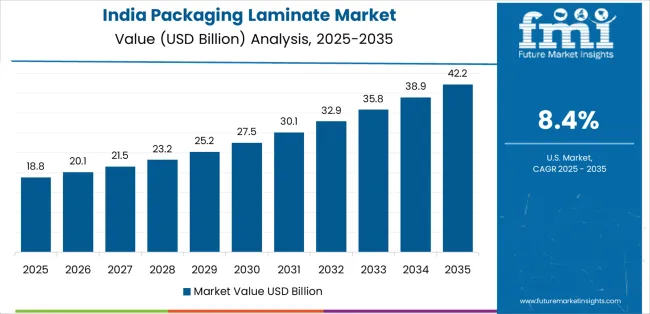
Revenue from packaging laminate in the USA is expanding at a CAGR of 5.8%, supported by the country's advanced food processing capabilities, strong emphasis on convenience food products, and robust demand for high-performance pharmaceutical packaging. The nation's mature food industry and high-value product focus are driving sophisticated laminate capabilities throughout the supply chain. Leading converters and material suppliers are investing extensively in advanced lamination technologies and barrier coating development to serve both domestic and export markets.
Revenue from packaging laminate in Brazil is growing at a CAGR of 6.9%, driven by the country's expanding food processing industry, growing agricultural product packaging, and increasing investment in flexible packaging development. Brazil's strong agricultural production and commitment to food exports are supporting demand for high-barrier laminate solutions across multiple product segments. Manufacturers are establishing comprehensive production capabilities to serve the large domestic market and growing regional export opportunities.
Revenue from packaging laminate in Germany is expanding at a CAGR of 5.3%, supported by the country's food industry leadership, advanced converting capabilities, and strategic focus on high-quality flexible packaging. Germany's engineering excellence and food safety standards are driving demand for laminates in dairy packaging, processed food products, and pharmaceutical applications. Manufacturers are investing in comprehensive quality management capabilities to serve both domestic food processors and international specialty markets.
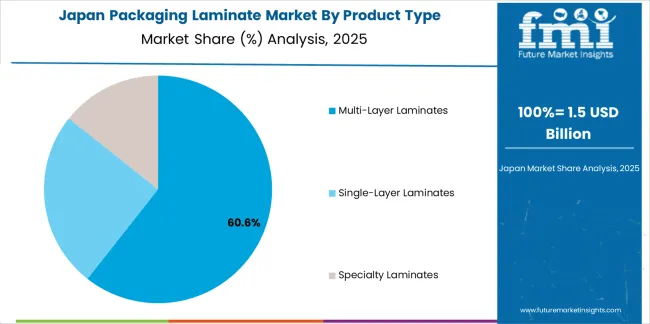
Revenue from packaging laminate in Japan is growing at a CAGR of 4.7%, driven by the country's expertise in precision converting, emphasis on quality control, and strong position in specialty food and pharmaceutical packaging. Japan's established converting technology capabilities and commitment to continuous improvement are supporting investment in advanced production technologies throughout major manufacturing centers. Industry leaders are establishing comprehensive quality assurance systems to serve domestic food processors and pharmaceutical manufacturers.
Revenue from packaging laminate in Indonesia is expanding at a CAGR of 7.8%, supported by the country's rapidly growing food processing sector, expanding consumer goods manufacturing, and increasing adoption of flexible packaging formats. Indonesia's large population and rising middle-class consumption are driving demand for affordable, high-quality laminate solutions in snack foods, instant noodles, and consumer products. Leading converters are investing in local manufacturing capabilities to serve the growing domestic market and regional export opportunities.
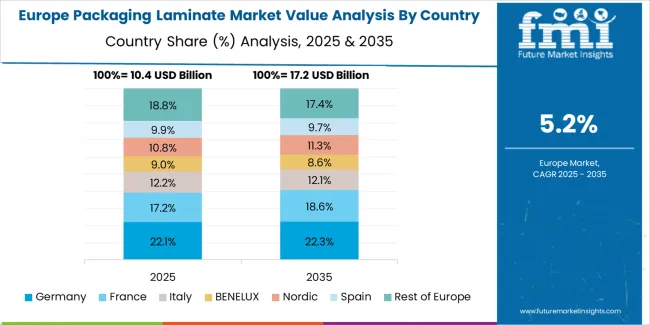
The packaging laminate market in Europe is projected to grow from USD 12.8 billion in 2025 to USD 23.7 billion by 2035, registering a CAGR of 6.4% over the forecast period. Germany is expected to maintain its leadership position with a 29.0% market share in 2025, declining slightly to 28.5% by 2035, supported by its strong food processing industry, advanced converting capabilities, and comprehensive flexible packaging sector serving diverse laminate applications across Europe.
France follows with a 19.0% share in 2025, projected to reach 19.5% by 2035, driven by robust demand for laminates in dairy packaging, pharmaceutical applications, and luxury consumer goods, combined with established converting expertise and specialty laminate production capabilities. The United Kingdom holds a 17.0% share in 2025, expected to maintain 17.0% through 2035, supported by strong food retail and growing e-commerce packaging activities. Italy commands a 15.0% share in 2025, projected to reach 15.3% by 2035, while Spain accounts for 10.0% in 2025, expected to reach 10.2% by 2035. The Netherlands maintains a 3.0% share in 2025, growing to 3.2% by 2035. The Rest of Europe region, including Nordic countries, Eastern Europe, Belgium, Switzerland, Austria, and Poland, is anticipated to gain momentum, expanding its collective share from 7.0% to 6.3% by 2035, attributed to increasing food processing operations in Eastern Europe and growing flexible packaging adoption in Nordic countries implementing advanced converting programs.
The packaging laminate market is characterized by competition among established flexible packaging converters, specialized film manufacturers, and integrated material suppliers. Companies are investing in advanced lamination technology research, barrier coating optimization, adhesive system development, and comprehensive product portfolios to deliver consistent, high-performance, and application-specific packaging laminate solutions. Innovation in adhesive-less lamination, mono-material structures, and functional coating systems is central to strengthening market position and competitive advantage.
Amcor plc leads the market with a strong market share, offering comprehensive flexible packaging solutions with a focus on food and pharmaceutical laminate applications. Sealed Air Corporation provides specialized high-barrier laminate capabilities with an emphasis on food protection and medical packaging. Berry Global Inc. delivers innovative laminate products with a focus on industrial packaging and agricultural applications. Constantia Flexibles specializes in pharmaceutical laminates and high-graphics consumer packaging solutions. Coveris focuses on food packaging laminates and retortable structures. Mondi Group offers integrated laminate solutions with emphasis on paper-based alternatives and mono-material development.
| Items | Values |
|---|---|
| Quantitative Units (2025) | USD 42.5 billion |
| Product Type | Multi-Layer Laminates, Single-Layer Laminates, Specialty Laminates |
| Material | Polyethylene-Based, Polypropylene-Based, Polyester-Based, Aluminum Foil-Based, Paper-Based |
| Application | Food & Beverage, Pharmaceuticals & Healthcare, Personal Care & Cosmetics, Agricultural Products, Industrial Packaging |
| Thickness | Thin (Below 50 Microns), Medium (50-150 Microns), Thick (Above 150 Microns) |
| Lamination Process | Solvent-Based, Solventless, Water-Based, Extrusion Lamination |
| End-User | Flexible Packaging Converters, Food Processors, Pharmaceutical Manufacturers, Consumer Goods Companies |
| Regions Covered | North America, Europe, East Asia, South Asia & Pacific, Latin America, Middle East & Africa |
| Countries Covered | United States, Canada, United Kingdom, Germany, France, China, Japan, South Korea, India, Indonesia, Brazil, Australia and 40+ countries |
| Key Companies Profiled | Amcor plc, Sealed Air Corporation, Berry Global Inc., Constantia Flexibles, Coveris, and Mondi Group |
| Additional Attributes | Dollar sales by product type and application category, regional demand trends, competitive landscape, technological advancements in lamination systems, barrier coating development, adhesive system innovation, and supply chain integration |
The global packaging laminate market is estimated to be valued at USD 42.5 billion in 2025.
The market size for the packaging laminate market is projected to reach USD 78.3 billion by 2035.
The packaging laminate market is expected to grow at a 6.3% CAGR between 2025 and 2035.
The key product types in packaging laminate market are multi-layer laminates, single-layer laminates and specialty laminates.
In terms of application, food & beverage segment to command 52.0% share in the packaging laminate market in 2025.






Full Research Suite comprises of:
Market outlook & trends analysis
Interviews & case studies
Strategic recommendations
Vendor profiles & capabilities analysis
5-year forecasts
8 regions and 60+ country-level data splits
Market segment data splits
12 months of continuous data updates
DELIVERED AS:
PDF EXCEL ONLINE
Industry Share & Competitive Positioning in Packaging Laminate Market
Litho Laminated Packaging Market from 2025 to 2035
Packaging Supply Market Size and Share Forecast Outlook 2025 to 2035
Packaging Testing Services Market Size and Share Forecast Outlook 2025 to 2035
Packaging Tubes Market Size and Share Forecast Outlook 2025 to 2035
Packaging Jar Market Forecast and Outlook 2025 to 2035
Packaging Barrier Film Market Size and Share Forecast Outlook 2025 to 2035
Packaging Films Market Size and Share Forecast Outlook 2025 to 2035
Packaging Burst Strength Test Market Size and Share Forecast Outlook 2025 to 2035
Packaging Tapes Market Analysis - Size, Share, & Forecast Outlook 2025 to 2035
Packaging Materials Market Size and Share Forecast Outlook 2025 to 2035
Packaging Labels Market Size and Share Forecast Outlook 2025 to 2035
Packaging Equipment Market Size and Share Forecast Outlook 2025 to 2035
Packaging Resins Market Size and Share Forecast Outlook 2025 to 2035
Packaging Inspection Systems Market Size and Share Forecast Outlook 2025 to 2035
Packaging Design And Simulation Technology Market Size and Share Forecast Outlook 2025 to 2035
Packaging Suction Cups Market Size and Share Forecast Outlook 2025 to 2035
Packaging Straps and Buckles Market Size and Share Forecast Outlook 2025 to 2035
Packaging Coating Market Analysis - Size, Share, & Forecast Outlook 2025 to 2035
Packaging Testing Equipment Market Analysis & Growth 2025 to 2035

Thank you!
You will receive an email from our Business Development Manager. Please be sure to check your SPAM/JUNK folder too.
Chat With
MaRIA